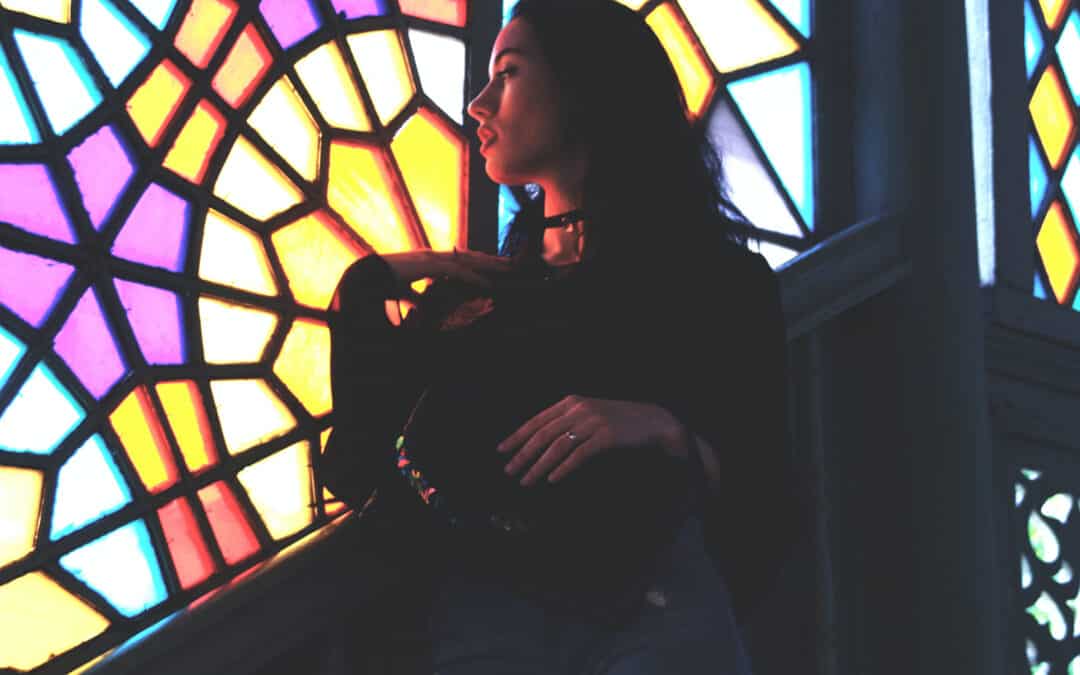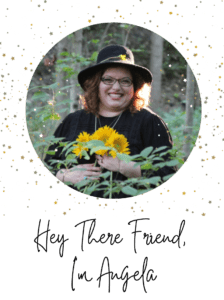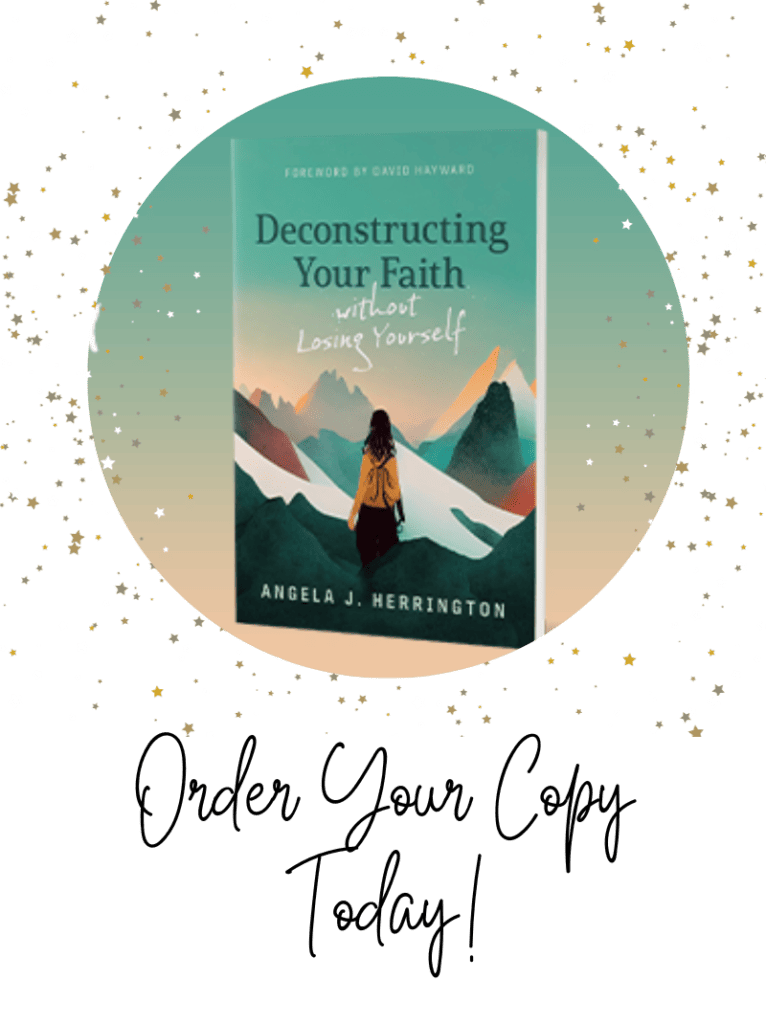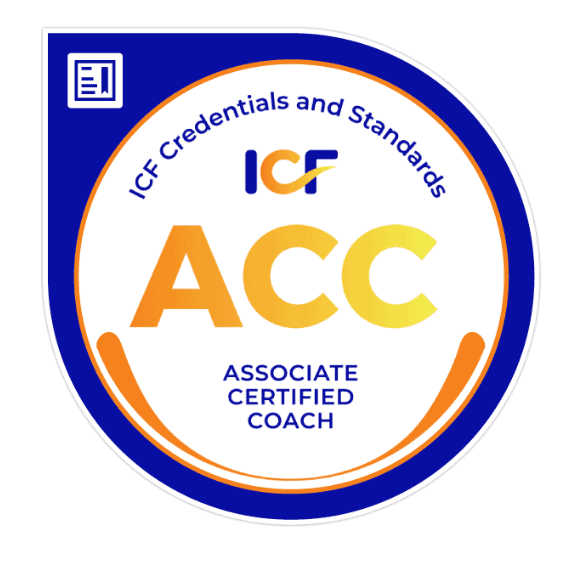Deconstructing your faith can seem like an overwhelming process to jump into, especially if you’ve spent much of your life embedded in Christian communities. There are a LOT of questions to ask and a LOT of answers for each question.
Wondering how to deconstruct your faith without getting overwhelmed?
Good news! That’s exactly what we are going to talk about today. As a faith deconstruction coach, I’ve helped lots of women untangle toxic religion. It can be a long process but it doesn’t have to be overwhelming if you know where to focus your energy. I’m going to give you seven questions to ask while you deconstruct your faith. These are deep questions that you’ll probably ask over and over again, so don’t put any pressure on yourself to get it perfect. There are literally no perfect answers, just honest ones, and those are almost ALWAYS messy and imperfect!
One of the most important things you need to know about how to deconstruct your faith and working through these questions is that you’re almost guaranteed to hear conflicting answers unless you happen to be part of a super healthy deconstructed local faith community. (Those communities are kinda like unicorns-I’m sure they exist but I haven’t personally found one yet.) So go in knowing there will be conflicting ideas; sorting out the true doctrines from the false ones is where heavy lifting will happen.
Be kind to yourself as you work through these questions, and make sure you have a circle of support to help you when it gets heavy. Deconstructing communities(like this one), therapy, and even coaches like me who specialize in this work will make this much easier to find the truth.
Let’s dive into the seven question to ask when deconstructing your faith:
1. Who am I?
This is one of those things that toxic religion really gets twisted. If you have grown up in the church you’ve probably been repeatedly told how sinful, broken, and untrustworthy you are. Particularly untrustworthy are our bodies, emotions, and intuition. We’ve been taught that our silence and submission to patriarchal hierarchy are the hallmarks of godliness.
But God has a completely different answer to this question. Our value and identity are deeply rooted in the pre-fall intimacy we had with God, nature, and each other. That story is consistent all the way through the Old Testament and into Jesus’ time, in spite of the constant presence of patriarchal, classist, xenophobic, and racist societies.
God says you are a cherished and anointed child of the Creator who has been gifted with a voice, body, mind, and soul that are valued more than any cultural push to subjugate the female half of the world’s population.
2. Who is God?
This one is a doozy and we could spend weeks discussing how toxic religion manipulates God to be what it needs Him to be in order to stay in power. (Yeah, I said that because it’s true.) The authoritarian, unapproachable, hyper-masculine deity that modern Christians promote demands obedience and constantly tests our strength and loyalty with traumatic events. That god is closely tied to white supremacy and European colonization. It’s designed to keep us in line with organized religion so that the powerful (mostly white) religious leaders get to stay in power. But none of that is true.
The Bible describes God as having three distinct parts: God, Jesus, and the Holy Spirit. Each is fully connected to the other two parts, but they tend to represent different aspects of the omnipresent Creator of all things. God is typically seen as father (or mother), Jesus is son and the Word that was present in Genesis, and the Holy Spirit has traditionally been represented as female (and sometimes as mother). The real God, unaltered by toxic religion, represents all of us and isn’t in the business of suppressing half of us just to see if we are good enough.
3. What is the Bible?
What’s your gut response to this question? If you grew up attending Vacation Bible School like I did, you probably thought “the inerrant word of God” or something similar. Toxic religious communities typically say the Bible, as we know it now, is 100% accurate—down to the letter. They believe the original translation, typically KJV or NKJV if they’re really progressive (insert eye roll), perfectly reflects God’s opinion on everything written inside. They also say that if it’s not included in the current version of the Bible, it shouldn’t shape our theology as much as biblical texts. But here’s the thing they don’t ever mention: The “original” text of the Bible isn’t the KJV. That was only created in the 1600s. In fact, the current format of the Bible wasn’t established until the 5th century and the translators intentionally changed passages to better represent their beliefs because they considered other versions to be corrupted. Plus, when the Bible refers to the Word, it’s talking about Jesus, not the book we hold in our hands today.
So the key thing to remember about this question is that the BIble is, and always will be, shaped by the people who translate it from ancient texts and preach it from pulpits every Sunday morning. Yes, God’s word is perfect, but human translations are far from perfect. That’s why it’s important to always go back to the Source when you’re trying to make sense of Bible passages. The late Rachel Held-Evans has a fantastic book that helped me deconstruct my faith around the Bible. Check it out here.
4. What is church?
This is another doozy because many of us have grown up in or around the typical church congregation that gathers on Sundays, and sometimes Wednesdays, for worship and preaching. Most have small groups, kids’ ministry, and community outreach. Some are connected to a larger denomination and others are independent. A few are unique in their location including bars, coffee shops, or other non-churchy settings. But the one thing that toxic religion gets wrong is how the church is positioned. It’s typically presented as the place God resides and belonging is key to deep connection with God.
By prioritizing belonging, the power balance shifts to heavily favor those in powerful positions within the church. If an individual is unwilling or unable to uphold the rules and regulations of the church, they can be excommunicated, shunned, or banned from the church. Leaders will even withhold the sacraments and refuse inclusivity in some of the most sacred moments in Christian faith. The rules vary widely and are often manipulated to protect the leadership rather than to serve the congregation.
But the deconstructed church, the global body of all believers that Jesus describes, looks radically different. Her systems favor the poor and oppressed rather than the wealthy white oppressors. The goal of the deconstructed church is to create an inclusive space for all with one shared belief in God’s two greatest commandments.
5. Who are my neighbors?
Part of asking yourself how to deconstruct your faith is asking yourself this question. If 2020 didn’t expose toxic religion’s position on this one, I don’t know what rock you were hiding under. The church has a really strange system of defining who Jesus was referring to when He said “love your neighbors.” On one hand, they spend more than a billion dollars per year on mission trips (mostly to developing countries) and an unknown amount is spent on sponsorship programs to support children. The church has an estimated half-million full-time missionaries serving around the world and one million serving in their home country. When you add those efforts to the numerous local programs churches host to meet community needs, it seems like this one is going pretty well.
But it’s not. Racism, classism, xenophobia, nationalism and just good old hard heartedness are rampant in the church. Typically, white evangelicals see other white people as neighbors deserving fair and equal treatment. When people of color raise concerns about racism and violence against BIPOC, the “good church people” are the first to deny and attempt to silence those voices with deflection or flat-out abuse. Christians are notorious for saying “all lives matter” until a person of color commits a crime, and then they start talking about how the death penalty is biblical and we should always follow God’s word.
And those mission trips? They often do more harm than good because they perpetuate the “white savior” narrative and undermine efforts by local people to lift up the community from within. Evangelicals also vehemently oppose generously caring for refugees at our borders while raising funds to support refugees elsewhere. Not to mention denying our role as colonizers who destroyed multiple indigenous people groups and rallying support for Israel’s attempts to recolonize Palestine.
The truth is that if we listen to God, we realize that our neighbors are neither ignorant savages that need to be saved by white Christians, nor are they violent out-of-control people who need to be violently policed and caged by white Christians. Loving our neighbors as ourselves means challenging where we’ve been taught that “others” get conditional love based on their behavior and willingness to comply with our terms. A deconstructed faith requires us to become allies and use whatever privilege we have to elevate the voices of neighbors who face daily persecution, oppression, and violence.
Recognizing, lamenting, and making reparations for the abuse of BIPOC people around the world is crucial to loving our neighbors. Understanding our neighbors are everyone, everywhere, without regard to how similar they are to you is key to deconstructing your faith.
6. What does it mean to love God with all your heart, soul, and mind?
According to Jesus, this is one of the two greatest commandments referenced in Matthew 22, and He should know. It seems really simple, so you would think it would be really easy for Christians to get this right, but there’s still a very clear line between how toxic religion views this and how the deconstructed church actually lives it out. There’s definitely some overlap between this question and the one above that talks about who God is, so I won’t restate all that, but just know that who you think God is DEFINITELY shapes how you love God.
In the case of toxic religion, what’s valued most is absolute obedience and deference to God’s authority. They then go one step further and extend that value to those speaking for God, which basically means church leadership and Christians with a lot of power. Therefore, loving God with our whole selves gets twisted into obeying everyone who claims God gave them power over us. Challenging or questioning their leadership is an offense to God and asking hard questions will get you labeled a Jezebel faster than they can clutch their pearls.
When we look at it that way, it becomes crystal clear why we have so many massive abuse scandals in the church. But the deconstructed church knows that loving God with all of ourselves means asking hard questions because those messy conversations are often what move us closer to God. Avoiding hard conversations builds a wall around God and teaches us that He is unreachable. PLUS, more importantly, God said to ask questions, Jesus said to ask questions, and on more than one occasion I’ve experienced the Holy Spirit opening my mouth to blurt out hard questions I had planned on keeping to myself. Being invited into those hard conversations with God was never meant to be limited to the elite. Loving means being present, asking, and listening to our Creator.
7. What am I capable of choosing? Free will is a thing, y’all. Every single human has it, and toxic religion loves to weaponize this concept and say it’s a key reason that most of us aren’t trustworthy. The core belief is that we are all sinful and broken and are more drawn to sin than to what is good and righteous. The solution, they say, is to fall into line with Christian morals and allow those to shape our good Christan lives. The only problem is that Christian morals are often so tangled up with the “worldly things” they say are sinful that it becomes hard to be accepted by the church and be a good person. Most of the examples of this are connected to gender, race, class, or any other factor that divides people into us versus them.
The toxic religious view of humans is that without Christian morals, we would push ourselves away from people who are different than us, but that’s exactly what the church does when it insists Chrsitian morals are the only choice. The reality is that Martin Luther King, Jr. was right when he said churches, filled with Christian morals, were our most segregated spaces.
The deconstructed church knows being Christian isn’t enough to make you a good person, especially if you’re deeply embedded in a toxic religion that promotes harm to others and then justifies it (with a smile) by saying “hate the sin, love the sinner.” The opposite is also true: there are a lot of good people who aren’t Christian, so that means our choices shape us more than our label. If we want to be good humans, we can choose to do that both inside the church or outside her walls. The key is to own our God-given ability to choose and recognize that our choices matter just as much as everyone else’s choices.
After reading all of that, you may be nodding your head in agreement or trying to pick your jaw up off the floor. Remember, I said that there’s a lot of ground to cover as you deconstruct your faith and there’s no perfect way to do it. So take a deep breath and check in with your body. She may need a hug and some gentle stretching 🙂
I’d love to support you as you wrestle with these questions and explore how to deconstruct your faith.
There are two ways to do that:
1. I have an on-demand workshop and workbook to help you deconstructing your faith without overwhelm. 7 Ways To Deconstruct Your Faith Without Overwhelm Workshop is a 7 day virtual workshop with a downloadable workbook, daily videos, and easy to follow activities. As bonus, I’ll also send you an invite to my free Facebook community, The Faith Deconstruction Cafe, a safe space to ask questions, connect with others who are deconstructing, and the place I will post exclusive content to support you! Learn more about the 7 Ways workshop here.
2. If you’re looking for more personalized support, click here to schedule a free consultation so we can talk about whether you’re ready for private faith deconstructing coaching! As a certified coach, seminary trained online pastor, and rebellious Gen X-er who has seen her share of hard things…I’d be honored to be your guide as you learn how to deconstruct your faith from toxic religion.
No matter what you choose when it comes to deconstructing your faith, I want you to know you’re on the right path and God is right there with you. Keep asking questions. Be kind to yourself and keep going! I believe in you. If you aren’t sure what deconstruction looks like, or where you are in your journey, I created a free faith deconstruction quiz for you to help you figure out which stage you are in! Take it here!

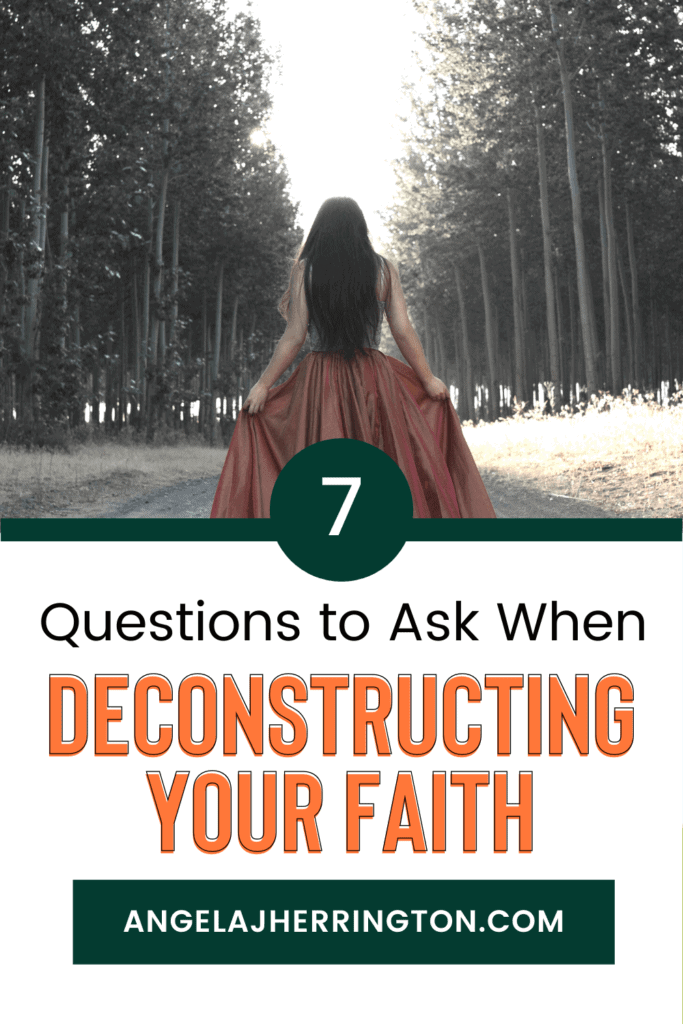

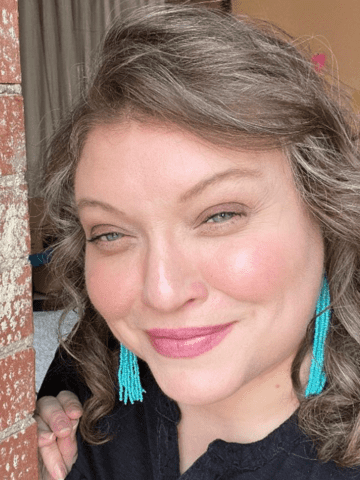
Angela is a Faith Deconstruction Coach and host of The Deconstructing Faith Summit who helps people break free from toxic religious culture & empowers them to recover from #churchhurt. She has led online ministries for a decade, enjoys working with clients 1:1, in groups, and is a dynamic conference speaker. She’s a Lark’s Song Certified Life Coach who reaches thousands of people in 40+ countries each month on Facebook, IG, Twitter, Pinterest, and her blog.
She’s a firstborn, Enneagram 8, Gen Xer who loves to question everything. She holds a BA from Indiana Wesleyan and a Masters in Leadership from Wesley Seminary. Her graduate research project focused on leadership development and opportunities for Gen X women in the US church.
Angela and her unique online ministry are featured in Lyz Lenz’s 2019 book God Land: Story of Faith, Loss, and Renewal in Middle America. She has published articles in Hope for Women and HOPE is Now magazines. She has been featured in The New Republic, Publisher’s Today, and Religion News Service.
Her first book, Deconstructing Your Faith Without Losing Yourself, Will be published by Eerdmans in February 2023.
Angela is also a wife, mom to 5, and a proud resident of Marion, Indiana with her family when they’re not traveling the US in their RV.

